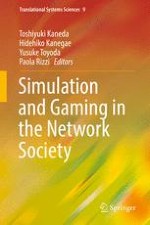2016 | OriginalPaper | Buchkapitel
Development of Gaming Material and Design Framework for Integrating Entrepreneurship Education into Problem-Based Learning in Mathematics
verfasst von : Kohei Numazaki, Toshiki Matsuda
Erschienen in: Simulation and Gaming in the Network Society
Verlag: Springer Singapore
Aktivieren Sie unsere intelligente Suche, um passende Fachinhalte oder Patente zu finden.
Wählen Sie Textabschnitte aus um mit Künstlicher Intelligenz passenden Patente zu finden. powered by
Markieren Sie Textabschnitte, um KI-gestützt weitere passende Inhalte zu finden. powered by
